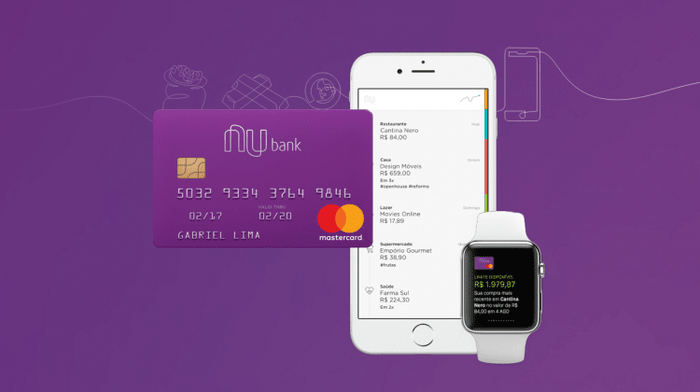Nubank's winning formula
Nubank is becoming a threat to traditional banks, which have to reboot if they don't want to lose customers.

A financial technology company focused on the generation of the millennium (millennials), 100% digital, with direct attention through the internet, social networks, email, or telephone 24 hours a day, 365 days a year. Everything, of course, in an application, or app, is downloadable from a smartphone. These are some of the ingredients of a formula that has been a winner for the Brazilian digital bank Nubank.
"More and more people need more opportunities and alternatives to invest their money," says David Velez, the Colombian founder and CEO of Nubank, the largest digital bank outside Asia. "There is a process to democratize access to financial services and we are just at the beginning of that revolution," he says.
Since it was difficult for people to entrust their money to a newly created digital bank, Nubank's first product was a no-charge credit card franchised with Mastercard. Today, it is the credit card with the loyalty index, measured by an indicator known as Net Promoter Score (NPS), which is based on customer opinions, the highest in the world, 89%, above giants like Apple (66%) and Amazon (64%).
Nubank believes that demographics play in its favor. "Half of Brazil is 29 years old (...) so we have large populations of millennials that have a different relationship with banks, there are large populations of unbanked and the opportunity we have as a technology company is to expand the banking," says Velez in an interview with the job site LinkedIn.
For 80% of its clients, Nubank's was their first credit card. Today, the bank already has more than 8.5 million customers in Brazil and is the fifth largest card issuer in the country, the largest economy in Latin America.
Its next step was NuRewards, a program of accumulation of points, which never expire, through purchases made with the credit card. In 2017, the bank launched NuConta, digital savings account with no maintenance fee, and a year later added a debit feature that allows you to make purchases and withdraw money. More recent are its digital accounts for small and medium business owners in Brazil.
Efficiency and low-interest rates
In a banking sector dominated by just five large national banks that control almost 90% of loans, and with interest rates that are usually among the highest in the world, Velez dared to found a digital bank in Sao Paulo in 2013.
According to the Colombian magazine Dinero, the average annual interest rate on credit cards in Brazil was 243%, well above Colombia's 30% and the United States' 15%. With the energetic entry of the Nubank card, which charged a rate of 25%, banks have been forced to lower their interest rates.
Nubank is thus becoming a threat to traditional banks, which have to renew themselves if they don't want to lose customers. Velez, an engineer with an MBA from Stanford University's business school, with experience in the New York investment bank Morgan Stanley and the Sequoia Capital venture capital fund in Sao Paulo, bet on this project in Brazil.
What motivated you to put aside a well-paid career in the investment world to form a digital bank? In the interview for LinkedIn, the entrepreneur says that the experience of trying to open an account in a Brazilian bank was a nightmare. "I went to the agency, I got caught between the doors, alarms started to go off, armed guards arrived, I had to leave, leave my things, go back in, stand in line for 20 minutes (...) I couldn't believe how horrible the banking experience was in this country. All the bureaucracy and frustration stayed in my head," he says.
One of the advantages of Nubank is its technology developed at home through functional programming, which provides access to the source code for anyone to view, modify, use or distribute a project for any purpose. This allows ideas to spread quickly, allowing collaboration, adoption, and remixing, as well as transparency. Nubank has also turned to data science to expand access to credit at low rates.
Capital injection
The company was founded amid the Brazilian economic crisis of 2013 with capital from Silicon Valley funds. Initial investors have been rewarded: Nubank became Brazil's third unicorn in March 2018 - companies worth more than $1 billion.
Today, the bank is adding capital injections of about $820 million in seven investment rounds since its founding. According to the Wall Street Journal, after the last round, Nubank's value would have skyrocketed to 10 billion dollars. Investors include Chinese internet giant Tencent and venture capital funds DST Global, Sequoia, Dragoneer, Ribbit Capital, and Thrive Capital.
Nubank - with its 1,500 collaborators of different nationalities and professions - already began its expansion process in Latin America this year with its landing in Mexico and Argentina, markets that share some of the characteristics of the Brazilian, such as the scarce banking, the complexity of the banking system and a large number of millennials.
The danger of the bubble
According to Moody's Investors Service, "most traditional operators will not be able to compete with a highly efficient, low-cost fintech. However, other observers, such as Gilberto Sarfati, a professor at the business school of the prestigious Brazilian think tank Getúlio Vargas Foundation, are more skeptical. "Until the company is listed on the stock exchange, it is merely speculative," he says.
Venture capital investors, after all, invest in countless companies waiting for a successful case to return up to 80 times the capital invested, says Andrea Minardi, a professor at the Insper business school in São Paulo. Will Nubank be one of them? Velez says that going public is not a matter of urgency. "It's great to be a private company," he says.




